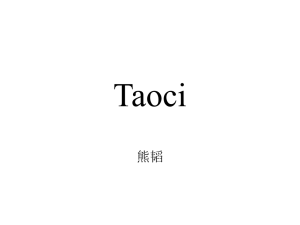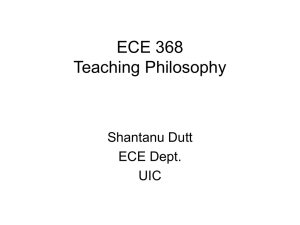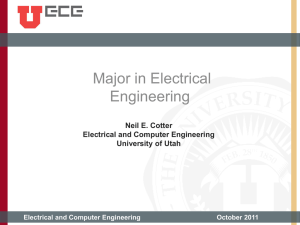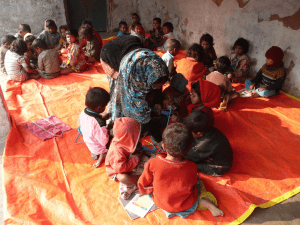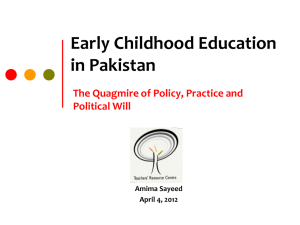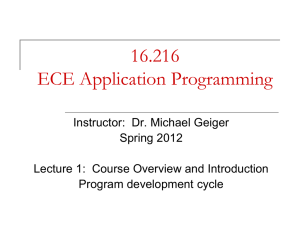My Perspective on *An Agenda for Amazing Children*
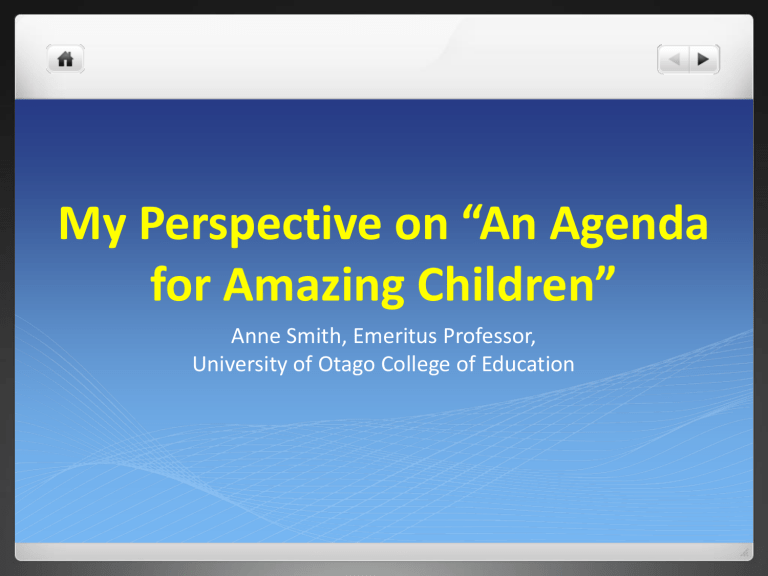
My Perspective on “An Agenda for Amazing Children”
Anne Smith, Emeritus Professor,
University of Otago College of Education
Rationale for ECT
To ensure that public investment in ECE will ensure the highest possible returns.
Concerns about recent significant increase in expenditure for Vote Education - more than doubled between 04 and
09 – most increase due to ECE spending.
Concern that current spending not reaching ‘neediest’ families.
Goals and Assumptions
Review the efficiency and effectiveness of spending on ECE and propose new ideas for innovative, cost effective and evidencebased ways to support children’s learning in ECE.
To improve outcomes for those children less likely to benefit from ECE – Maori, Pasifika and children from disadvantaged backgrounds
Not just about cutting costs.
Composition of EC Taskforce
Michael Mintrom (chair);Tanya Harvey; Claire
Johnstone; Richie Poulton; Peter Reynolds;
Anne Smith; Aroaro Tamati; Laurayne Tafa; Ron
Viviani.
Time Scale
October 2010 – Taskforce Convened, 6 months to report,
Submissions until end of January 2011
Report completed early April, delayed release until after the budget, released early June 2011
Consultation until August 8th
Principles of ECT Report 2011
Respect fiscal constraint
Promote economic growth
Use government funds efficiently
Fairness: Encourage cultural diversity
Fairness: Ensure access for all to high-quality early childhood education services
Encourage parental connections to the paid workforce
Principles (continued)
Create a predictable environment for service providers
Pursue administrative simplicity and low compliance costs
Encourage sector collaboration
Promote innovation across the sector.
Strategic Plan Working Group Report (2001)
Why develop a strategic plan for early childhood education?
The long term strategic plan offers a comprehensive and cohesive policy framework, goals and strategies for early childhood education. It starts from the interests of infants, toddlers and young children and the conditions needed
to support their learning environments. The plan is based on national values for children in Aotearoa/New Zealand and aims to build the best early
childhood services in the world. It comes at a crucial time for ECE, after a decade of short term planning and ad hoc changes to policies and rules. The plan will point a new direction that puts the sector on a sound footing for the next ten years and beyond.
Values in Strategic Plan Report 2001
The working group that developed the consultation document for the strategic plan adopted the following values:
to honour Te Tiriti o Waitangi;
to observe the United Nations Convention on the Rights of the Child (UNCROC);
to facilitate fair, inclusive, and equitable ECE;
to promote high quality ECE;
to accept ECE as equal in status with other education sectors;
Values in SPR (cont)
to respect diversity of services, philosophies and pedagogies;
to address the interests of the child, whänau/family, and society;
to benefit the whole child; and
to foster collaboration between children, adults, and organisations.
Good Things in the ECT Report
Investing in quality
Increased participation of non-participating groups
Recognising key elements of quality
Te Whāriki and non-cognitive skills valued
Another discipline to support value of ECE - Economics
Recognition of the value of investing in quality ECE
Investing in quality
Cost Benefit studies – positive interventions incur costs, but “the findings show that for every dollar invested, the resulting returns fell within the range of $3 to
$16. In percentage terms, these are massive returns on investment” (ECTR. p.21).
James Heckman (Nobel laureate economist) – “advantages accumulate, so do disadvantages” (2004).
Benefits are for everyone - children, families, taxpayers, governments, societies.
“The return on investment to the public of EC development programs far exceeds the return on most projects that are currently funded as economic development, such as building sports stadiums” (Calman & Tarr-Whelan, 2005).
Participation in low quality is not worth investing in and may be harmful
“Responsible investments in services for young children and their families focus on benefits relative to cost. Inexpensive services that do not meet quality standards are a waste of money. Stated simply, sound policies seek
maximum value rather than minimum cost” (National Council on Developing
Child, Harvard University, 2007).
See Essay 1: Aiming for High Quality Services
Children who attend low quality preschools had cognitive and behavioural scores no different from children who had not been to preschool at all
(Sylva, Melhuish et al, 2011).
The particular importance of quality for under 2s
Findings of several reports converge on the necessity of really high quality environments for under twos and their particular potency to support ‘at risk’ children:-
Dalli et al (2011) – ECE should provide sensitive responsive caregiving and avoid toxic stress.
Carroll-Lind & Angus (2011) “Whether the substitution of parental care for nonparental care results in an increase of decrease in child well-being depends on the quality of the care” (p. xvi)
Gluckman (2011) – “Early childhood is the critical period in which executive functions such as the fundamentals of self control are established” (p.1).
Mitchell, et al (2011) Pathways report – concerns with quality for under twos.
Importance of investing in quality ECE for under twos (not just 3 and 4 year-olds)
See Recommendations 3, 4, 5, 6
Goal to increase participation by some groups – Maori, Pasifika, LSES.
Gap between uptake of ECE between children of more middle-class backgrounds. Overall participation rate in ECE before school – 94.5%, for Maori 89.4% and Pasifika 85.3%
See Essay 4: Achieving Access for All Children.
Need for over-arching governance or management support structures
Development of integrated community hubs (Rec 18, 19).
Funding mechanisms (but severe reservations about these, Rec 10)
Recognition of the importance of qualified staff for quality
“Highly qualified and professional teachers are an investment in the provision of quality ECE services. There is no question that such teachers are the ones that have the most positive impact on valued outcomes for children. Investment in this area now will pay benefits both in the short-term and the long-term” (ECTR, p. 160).
Despite earlier ECE funding, cuts the ECTR comes out in favour of the value of qualified staff:-
Regulating for 80% of staff to have ECE qualifications
Funding incentives for increasing percentage of trained staff
Tensions result from this recognition, as it seems to place less value on some services (home-based, playcentre, TKR, play groups)
Improvements to regulations – staff/child ratios, group size, qualified staff
Regulating a ratio of 1 adult to every 4 children under two (Rec 3) but not until Phase 3
Regulating for group size (Rec 4)– Phase 1, NOTHING IN REGS CURRENTLY
Continued valuing of Te Whāriki and its approach
“The preoccupation with cognition and academic ‘‘smarts’’ as measured by test scores to the exclusion of social adaptability and motivation causes a serious bias in the evaluation of human capital interventions”….. “Success or failure at this stage(preschool) feeds into success or failure in school which in turn leads to success or failure in post-school learning. Early learning begets later learning and early success breeds later success just as early failure breeds later failure”.
(Heckman, 2000, p.3. AND P. 5)
“In early childhood, children are developing more elaborate and useful working theories about themselves and the people, places, and things in their lives…
Knowledge, skills and attitudes combine as dispositions” (Te Whāriki , 1996, p.
44)
Basically the ECTR supports Te Whāriki – wants to see it implemented properly.
Contribution from another discipline to ECE knowledge - Economics
For example: Research on human capital from a Swedish economist/sociologist Gosta Esping-Andersen
Inequality inherited and passed on from generation to generation unless intervention
Participation in high quality ECE has an equalizing effect. Nordic countries have significantly reduced inequality by near universal participation of children in quality ECE. (Danish children from low income backgrounds do 4 times better than German and US children from similar backgrounds). Possible to reduce the effect of having a mother with little education, few books in the home, or living in poverty.
Recommends a universal approach NOT targeting.
Worrying Things in the ECT Report
Focus on economic development (not on child or family wellbeing and rights or other values for the future of children)
Focus on participation of parents (mainly women) in paid work force and not enough recognition or emphasis on value of unpaid work of parenting
Move towards targeted rather than universal services (a deficit model?)
Probable demise of 20 hours
Support for unfettered market
Focus on economic development
Compare the language in the principles of the ECTR and the language in the
Strategic Plan Working Party Report: fiscal constraints, economic growth,
efficiency versus fairness, interests of children, values, and equity.
Women as paid workers
See Essay 8: Supporting parental engagement in the paid workforce. Priority for funding is on supporting parents who wish to participate in the paid workforce. Most convincing benefit relating to cost is the tax contribution working parents make.
Paid work is important – Esping-Anderson showed that parents’ connection to the workforce (provided stable and good job conditions) predict higher educational achievement. [But also showed parental time investment in children predicted good outcomes.]
Does the report fail to acknowledge the importance of parenting and the complexity of mothers’ lives? Bruce McMillan points out playcentre’s role in supporting parents and helping parents to become reconnected with their own learning. The report tends to view women who do not do paid work (especially single parents), as beneficiaries or dependants and (I think) undervalues the importance of their parenting.
Targeted rather than universal approach
The principle of universal accessibility will be lost if the new funding recommendations are implemented. The ECTR states it will “provide strongly differentiated payments for priority groups – Maori, Pasifika, children from lower SES groups and children with special educational needs.”
Families with ‘non-priority’ children will have to pay more.
Universal access best – largest economic gains when all SES groups participate.
Targeting costly, time-consuming and stigmatizing. “The basic dilemma of targeted policy is how to ensure that it does reach the needy” (Esping-Andersen)
If middle-class families have to pay more their participation rates will decline.
Demise of 20 Hours
Brenda Bushouse (2008) described the 2007 policy of 20 hours of free ECE for 3 and 4 year-olds as “symbolising a paradigm shift”.. showing the government “believes ECE is important enough for the government to remove financial barriers to participation for all children” (2008, p. v). She said that “the next government will make a fundamental decision to continue the paradigm shift of revert back to a subsidy programme” (p. vi).
If the funding reforms proposed in the ECTR are implemented that is exactly what will happen.
Move backwards away from the trends in OECD countries to provide at least
2 years of free ECE provision before children go to school.
The Market
“We do not consider that the government should have a direct role in determining ECE teachers’ pay and conditions. ECE services are delivered in a market setting and many ECE services within the overall sector are privately owned business” (ECTR, p. 156). “Market demands for employing qualified staff ensure that appropriate terms and conditions of employment are available” (ECTR, p. 157).
No constraints on ECE centres to set fees.
Lack of constraints on employers as to the salaries they pay
Move away from cost drivers (teacher salaries) and requirement to pay minimum salary levels in collective agreement.
Final Thoughts
This debate is not over yet.
Having an input makes a difference (note Minister’s announcement re
Playcentre funding)
Crucial to inform politicians and public about these issues
Ask questions about what ECTR recommendations mean
Get involved somehow and get parents involved - election policies still to appear
Best to use your own voice rather than group mailings
